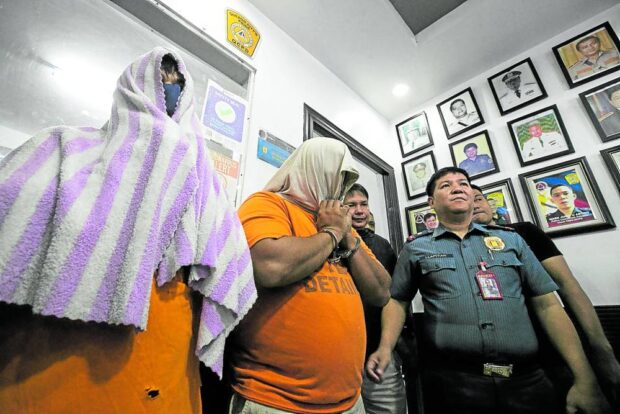PNP to limit info released to media

‘FIRING LINE’ Under the Philippine National Police’s new guidelines, presenting crime suspects in a “firing line,” like what the police did in this photo taken in July, will now be prohibited to protect their privacy. The suspects’ identities will also be partly withheld. —LYN RILLON
MABALACAT CITY—The Philippine National Police will no longer disclose to the media the identities of arrested crime suspects, citing privacy issues outlined by its newly released guidelines.
In an online meeting with journalists in Central Luzon on Thursday, Maj. Aileen Rose Stanger, public information officer of regional police, said the PNP issued a revised media relations policy on Sept. 11 that became effective on Tuesday.
“Release of information/details of victims, suspects and arrested persons will not lead to their identification,” part of the new guidelines stated.
Only validated wanted persons, particularly those on the PNP list of individuals being sought by the law, may be identified by names or photos, it said.
Stanger said withholding the full names and photos of arrested crime suspects was part of upholding the suspects’ rights.
She said only the family name or an alias of a suspect would be given to reporters.
According to Stanger, many individuals arrested after allegedly committing crimes were eventually released, or charges against them were dropped for different reasons like mistaken identity, insufficient evidence and similar circumstances.
“The PNP leadership wants to initially protect the arrested persons’ reputation and image, as well as the members of their families, who are also affected by disclosing the names and photos of the arrested individuals,” she added.
The guidelines reiterated the prohibition of presenting suspects in a “firing line” before members of the media for a photo session.
On the release of information involving police personnel, the PNP said that while the organization adheres to freedom of information, the constitutional rights of involved personnel must be upheld and information to be disseminated must be based on investigation results and verified facts.
Data privacy, FOI
The PNP now also requires members of the media to seek accreditation from provincial and regional police offices to cover crime and police stories. Certificates of endorsement from the bureau chief, editor or station manager were also required.
“It is very easy nowadays for anyone to wear a shirt with ‘media’ or ‘press’ prints and pretend or act like a legitimate member of the media. The PNP would like to avoid this,” she said.
In Negros Occidental, the provincial police’s public information office said the revised policy was based in Republic Act No. 10173 or the Data Privacy Act and the PNP Freedom of Information (FOI) Manual.
“The media will have to send formal requests for information to the chiefs of police through the [FOI] personnel of each police station,” it said.
The Negros Occidental police, however, could not provide reporters a copy of the PNP memorandum on the matter since it lacked permission from the regional police.
They said they would wait for the official copy for publication from the PNP headquarters.
Marchel Espina, president of the National Union of Journalists of the Philippines (NUJP) Bacolod City chapter, expressed concerns over the revised policy of the PNP.
“We understand the importance of respecting the privacy and safety of individuals involved in these cases, but we believe it is equally vital to maintain transparency and accountability in law enforcement operations,” she said in a statement on Thursday.
According to Espina, when the names of suspects and victims were consistently withheld, it could create an “atmosphere of secrecy and mistrust,” dismissing the PNP’s commitment to transparency and accountability to the public.
Withholding the names, she said, may also hinder the community’s ability to assist authorities in their efforts to solve crimes or provide support for victims and their families.
“While we believe that there should be clear and consistent policy in deciding when to release names, it is equally important that the guidelines and protocols should strike a balance between the need for privacy and the need for transparency,” Espina said.
Espina, also an NUJP national director, stressed that it was the responsibility of the media, as a watchdog, to ensure accountability and transparency in law enforcement and public office.
“Through unbiased reporting, and access to public records, we hold police officers and public officials accountable for their actions to ensure fairness. It is [important] that gatekeeping of such information would come from the media, and not the police themselves,” she said.
“We call on the PNP to reconsider its policy regarding the disclosure of names in media reports to establish a more transparent and accountable approach to strengthen public trust and to foster a safer community,” she added.
Lawyer Edre Olalia of the National Union of Peoples’ Lawyers said the PNP’s revised media relations policy should be studied well.
“Offhand, any limitation or restriction on freedom of the press and right of the people to information of matters of legitimate public interest or concern carry the burden that it is unacceptable at best or even illegal or unconstitutional at worst,” he said.